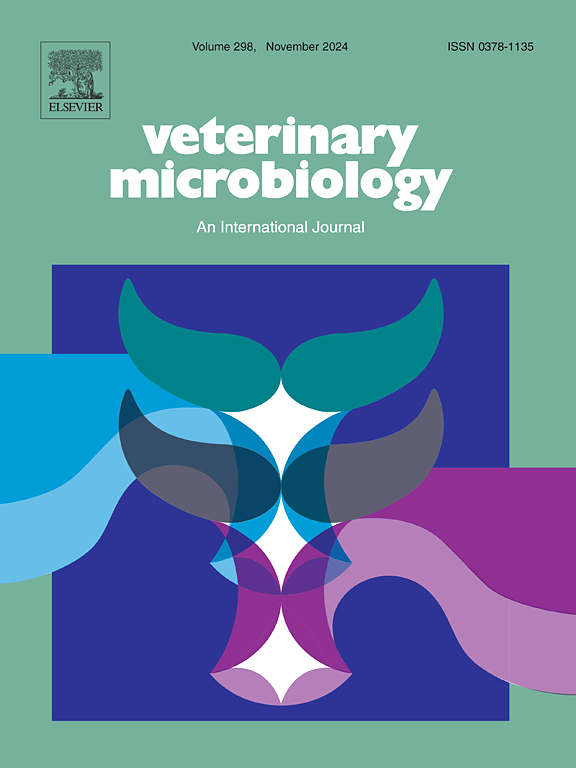A modified-live Mannheimia haemolytica expressing Mycoplasma bovis EFTu and Hsp70 induced systemic and mucosal antibody responses in American bison but failed to fully protect against Mycoplasma bovis challenge.
IF 2.7
2区 农林科学
Q3 MICROBIOLOGY
引用次数: 0
Abstract
Mycoplasma bovis (M. bovis) is an emerging pathogen in American bison (Bison bison) responsible for high mortality epizootics of severe pneumonia and systemic disease. Though M. bovis poses a significant threat to bison conservation and ranching, there are no commercial vaccines licensed for use in this species. To this end, novel modified-live Mannheimia haemolytica (M. haemolytica) vaccine strains, serotypes 1 and 6, secreting inactive leukotoxin fused to truncated M. bovis Elongation Factor Thermal unstable (EFTu) and Heat shock protein (Hsp) 70 (EFTu-Hsp70-ΔlktCAV4) were evaluated for efficacy in bison. Modified-live M. haemolytica were administered intranasally and both serotypes were sporadically recovered from bison nasal swabs. Bison inoculated with the two M. haemolytica EFTu-Hsp70- ΔlktCAV4 strains produced systemic and mucosal antibodies to the M. bovis antigens and M. haemolytica surface antigens prior to intranasal challenge with M. bovis. Following intranasal M. bovis challenge no differences were observed in lung bacterial counts nor in lung lesion formation between bison that received the M. haemolytica EFTu-Hsp70-ΔlktCAV4 strains or the ΔlktCAV4, lacking the M. bovis antigens. Despite this, fewer M. bovis positive tissue swabs were collected from animals administered the M. haemolytica EFTu-Hsp70-ΔlktCAV4. These results demonstrate that modified-live M. haemolytica vaccine strains expressing M. bovis antigens failed to provide full protection against M. bovis infection in bison.
一种表达牛支原体EFTu和Hsp70的改性活溶血性曼海姆病在美洲野牛体内诱导了全身和粘膜抗体反应,但不能完全保护野牛免受牛支原体的攻击。
牛支原体(牛支原体)是美洲野牛(美洲野牛)中一种新出现的病原体,负责严重肺炎和全身性疾病的高死亡率动物流行病。虽然牛分枝杆菌对野牛的保护和牧场构成重大威胁,但目前还没有许可用于该物种的商业疫苗。为此,研究人员对新型溶血曼氏病(溶血曼氏病)改良活疫苗(血清型1和血清型6)在野牛体内的有效性进行了评价,该疫苗分泌的无活性白毒素与牛分枝杆菌伸长因子热不稳定因子(EFTu)和热休克蛋白(Hsp) 70 (EFTu- hsp70 -ΔlktCAV4)融合。改良活溶血支原体经鼻内注射,从野牛鼻拭子中零星地检出两种血清型。Bison接种了两种溶血分枝杆菌EFTu-Hsp70- ΔlktCAV4菌株,在鼻内攻毒牛分枝杆菌之前,产生了针对牛分枝杆菌抗原和溶血分枝杆菌表面抗原的全身和粘膜抗体。在鼻内牛分枝杆菌攻毒后,在接受溶血分枝杆菌EFTu-Hsp70-ΔlktCAV4菌株或缺乏牛分枝杆菌抗原的ΔlktCAV4菌株的野牛之间,肺细菌计数和肺病变形成没有差异。尽管如此,从使用溶血分枝杆菌EFTu-Hsp70-ΔlktCAV4的动物身上收集到的牛分枝杆菌阳性组织拭子较少。这些结果表明,表达牛支原体抗原的溶血支原体改良活疫苗株不能完全保护野牛免受牛支原体感染。
本文章由计算机程序翻译,如有差异,请以英文原文为准。
求助全文
约1分钟内获得全文
求助全文
来源期刊

Veterinary microbiology
农林科学-兽医学
CiteScore
5.90
自引率
6.10%
发文量
221
审稿时长
52 days
期刊介绍:
Veterinary Microbiology is concerned with microbial (bacterial, fungal, viral) diseases of domesticated vertebrate animals (livestock, companion animals, fur-bearing animals, game, poultry, fish) that supply food, other useful products or companionship. In addition, Microbial diseases of wild animals living in captivity, or as members of the feral fauna will also be considered if the infections are of interest because of their interrelation with humans (zoonoses) and/or domestic animals. Studies of antimicrobial resistance are also included, provided that the results represent a substantial advance in knowledge. Authors are strongly encouraged to read - prior to submission - the Editorials (''Scope or cope'' and ''Scope or cope II'') published previously in the journal. The Editors reserve the right to suggest submission to another journal for those papers which they feel would be more appropriate for consideration by that journal.
Original research papers of high quality and novelty on aspects of control, host response, molecular biology, pathogenesis, prevention, and treatment of microbial diseases of animals are published. Papers dealing primarily with immunology, epidemiology, molecular biology and antiviral or microbial agents will only be considered if they demonstrate a clear impact on a disease. Papers focusing solely on diagnostic techniques (such as another PCR protocol or ELISA) will not be published - focus should be on a microorganism and not on a particular technique. Papers only reporting microbial sequences, transcriptomics data, or proteomics data will not be considered unless the results represent a substantial advance in knowledge.
Drug trial papers will be considered if they have general application or significance. Papers on the identification of microorganisms will also be considered, but detailed taxonomic studies do not fall within the scope of the journal. Case reports will not be published, unless they have general application or contain novel aspects. Papers of geographically limited interest, which repeat what had been established elsewhere will not be considered. The readership of the journal is global.
 求助内容:
求助内容: 应助结果提醒方式:
应助结果提醒方式:


